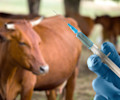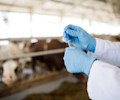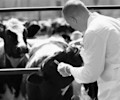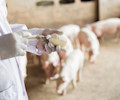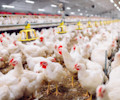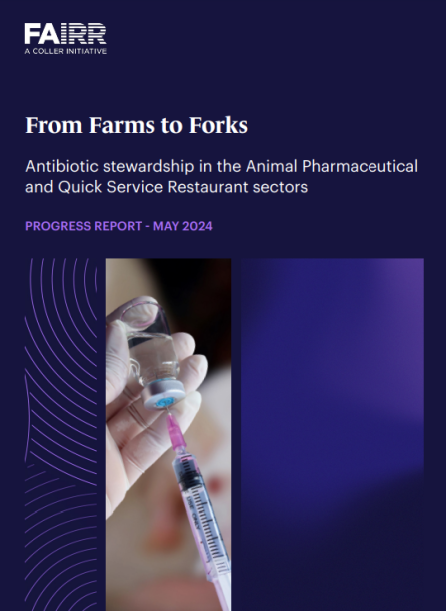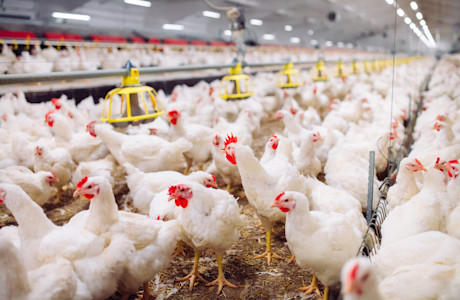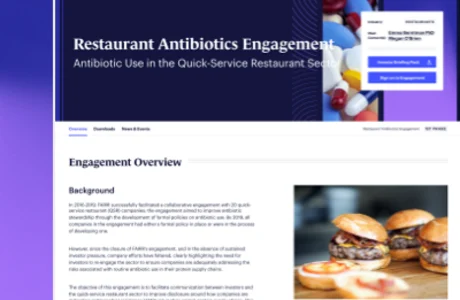Ahead of the UN General Assembly’s second-ever High-Level Meeting on antimicrobial resistance in September, 80 investors back statement from Investor Action on Antimicrobial Resistance (IAAMR)
Investors call on global leaders to ramp up efforts to tackle antimicrobial resistance (AMR), recognised as a systemic risk akin to COVID-19 and the 2008 financial crisis
AMR killed more people than HIV/AIDS and malaria in 2019, and AMR-related treatments and productivity losses could cost US $412 billion and US $443 billion respectively per year by 2035
“An estimated 80% of antibiotics are administered to livestock rather than people in the United States alone. Investors recognise that AMR is not only a threat to the health of our people and planet, but to the financial well-being of those who rely on investment returns to fund their retirements.” Jeremy Coller, Founder, FAIRR
Investors representing over US $13 trillion in combined assets have signed a statement urging global leaders and policymakers to take action to curb the spread of antimicrobial resistance (AMR) ahead of the UN General Assembly’s second-ever High-Level Meeting on AMR later this month.
The statement is the latest call to action from the Investor Action on AMR (IAAMR) initiative, founded by the Access to Medicine Foundation, the US $75 trillion backed FAIRR investor network and the UK Department of Health and Social Care.
The 80 investor signatories, including Legal & General Investment Management (LGIM) and HESTA, are calling on global leaders and policymakers to act on seven critical asks* for tackling AMR – encompassing science-based guidance and targets, effective stewardship and a ‘One Health’ approach considering the interplay between animal, human and environmental health.
Recognised as a leading threat to global health and the economy, the clock is ticking as the cost of AMR becomes clearer. Without substantial action, AMR-related treatments and productivity losses could cost US $412 billion and US $443 billion respectively per year by 2035. AMR claimed 1.27 million lives in 2019, more than both HIV and Malaria, a number projected to rise to ten million annually by 2050.
The COVID-19 pandemic spurred investor recognition of the financial imperative to combat systemic health risks. FAIRR analysis finds that, since 2020, at least 20 shareholder resolutions have targeted AMR risks throughout global supply chains – from pharmaceutical companies and livestock producers, to food retailers and restaurants.
FAIRR and ATMF are both leading well-supported investor engagements on the issue and have partnered with the MSCI Sustainability Institute to publish an investor guide on AMR**. This guide was presented to investors during a roundtable in August.
Despite the current lack of an international framework, awareness among policymakers is also growing. Earlier this year, the UK government pledged £85 million to support the research and development of new antibiotics, improve global health infrastructure, and strengthen surveillance systems to accurately monitor AMR threats.
In line with this investor statement, the UK and Saudi Arabian governments have called for an Intergovernmental Panel on Climate Change (IPCC)-style independent panel on AMR. The proposed panel should monitor the future risks and impacts of AMR and provide policymakers with regular scientific assessments to support decision making and inform global targets. As leaders prepare for the upcoming UN General Assembly High-Level meeting, the investor community's message is clear: addressing AMR is not just a health necessity but also an economic imperative. The IAAMR's seven key asks outline a comprehensive approach to tackling the AMR crisis, emphasising the need for global cooperation, sustained funding, and innovative solutions to ensure a healthier future.
Jeremy Coller, Founder of FAIRR, said:
"Investors representing over US $13 trillion in combined assets have urged leaders to take action to curb the spread of antimicrobial resistance (AMR) as they recognise the investment risk AMR poses to many companies in the global food supply chain.
“Companies – from pharma to pork producers – take advantage of lax regulations allowing the routine use of antibiotics in animals enabling them to cut corners in animal welfare, while diminishing antibiotic effectiveness in humans. An estimated 80% of antibiotics are administered to livestock rather than people in the United States alone. Investors recognise that AMR is not only a threat to the health of our people and planet, but to the financial well-being of those who rely on investment returns to fund their retirements.”
Dame Sally Davies, UK Special Envoy on Antimicrobial Resistance (AMR), said:
"This September will see a High-Level Meeting on AMR at the United Nations in New York. This will be an opportunity for all sectors to mobilise together against this economic emergency. Investors have a crucial role to play to collectively chart a path forward to health, food and economic security.
“The Investor Action on AMR initiative is driving action and I call on all investors to join us in working across sectors to tackle the inter-generational AMR pandemic."
Jayasree K. Iyer, CEO, Access to Medicine Foundation, said:
“It is imperative we address AMR with decisive, coordinated global action. The joint investor statement on AMR frames seven investor asks emphasising the need for global policymakers to prioritise sustainable investments. This collaboration, in the run up to UNGA and beyond, will be pivotal in brokering dialogue around reducing AMR, safeguarding public health, and ensuring the efficacy of life saving medicine for future generations worldwide.”
Maria Larsson Ortino, Senior Global ESG Manager, Health Lead, Legal & General Investment Management (LGIM), said:
"LGIM has long understood the significant impact of AMR on both financial markets and global public health, and the support from other investors for the IAAMR statement highlights the critical attention this issue deserves.
“AMR poses a serious threat to investment portfolios, economic stability, and global health. It's encouraging to see a unified response from the investment community, reflecting a shared commitment to address this urgent challenge. LGIM stands firmly behind this statement and calls on others to join us in seeking effective solutions to combat AMR, and we hope the UN General Assembly will drive meaningful progress on this crucial issue."
Notes to editor
For more information, including interviews and comment, please contact:
Georgia Dalton, ESG Communications
t: +44 (0)7798 751 529 | e: georgia@esgcomms.com
** Health and Wealth - An Investor’s Guide to Antimicrobial Resistance is available here.
*IAAMR considers the following seven asks to be essential in tackling the AMR crisis:
Science-based Guidance and Targets
1. We encourage global policymakers to support the establishment of an independent panel, modelled on the International Panel on Climate Change (IPCC), to provide policymakers with regular scientific assessments on AMR.
2. We encourage global policymakers to support the development of an international framework, such as the Montreal Protocol or the Paris Agreement, for AMR with a science-based target to guide sustained and cohesive action on AMR.
Stewardship and One Health
3. We encourage global policymakers to commit to reductions in the use of antibiotics in agriculture and end the routine use of antibiotics for growth promotion and group prophylaxis in animal farming.
4. We encourage global policymakers to adopt legislative initiatives to set maximum residue limits for antibiotics in wastewater from manufacturing facilities. We encourage global policymakers to establish appropriate mechanisms to manage antibiotic residues entering the environment from additional sources such as livestock manure and wastewater treatment systems.
Integrated Surveillance
5. We encourage global policymakers to continue to support the establishment of a globally integrated surveillance system for AMR and antibiotic use, building on existing quadripartite surveillance systems, to identify patterns and react accordingly. This should integrate data across humans, animals, and the environment. In particular, global policymakers should align on legislative requirements, similar to those of EU member states, requiring the volume and use of antibiotics in animal agriculture to be accurately collected and reported.
Funding the Development of New Antimicrobials
6. We encourage global policymakers to continue to promote research and development (R&D) of new antimicrobials and alternatives to antimicrobials, especially those that target priority pathogens as defined by the World Health Organisation ensuring the needs of low-and middle-income countries (LMIC) are taken into account. We note that several G7 countries have introduced push and pull incentives and encourage other nations to put similar mechanisms in place to ensure the future development and availability of critical antimicrobials and alternatives to antimicrobials.
Global Equitable Access
7. We encourage global policymakers to address the lack of equitable global access to novel and existing antimicrobials and alternatives to antimicrobials. This could be supported by establishing a multilateral fund to provide financing to LMICs to drive equitable access to antimicrobials; engaging with the generics and biosimilars market to incentivise that they work to meet supply and demand with quality assured products; supporting the implementation of national action plans; improving surveillance systems; and mandating early access planning in all R&D collaborations.
About FAIRR
The FAIRR Initiative is a collaborative investor network, founded by Jeremy Coller, with a membership of US $75 trillion in collective assets of support. FAIRR works with institutional investors to define the material ESG issues linked to intensive livestock and fish farming systems and provide them with the tools necessary to integrate this information into their asset stewardship and investment decisions. This includes the Coller FAIRR Index, the world’s first comprehensive assessment of the largest global animal protein companies on environmental, social and governance issues. Visit www.fairr.org and follow @FAIRRInitiative.
About Access to Medicine Foundation
The Access to Medicine Foundation is an independent non-profit organisation that seeks to transform the healthcare ecosystem by motivating and mobilising companies to expand access to their essential healthcare products in low- and middle-income countries. The Foundation is funded by the Dutch and UK governments, the Bill and Melinda Foundation, the Leona M. and Harry B. Helmsley Charitable Trust, Wellcome Trust, AXA Investment Managers and Stewart Investors.

